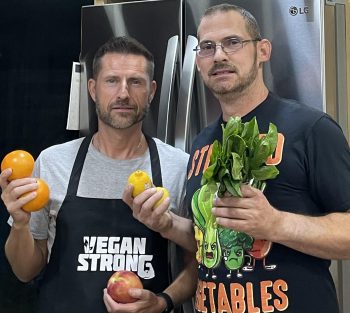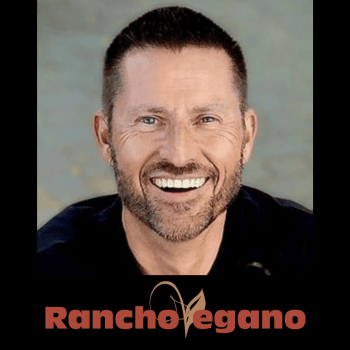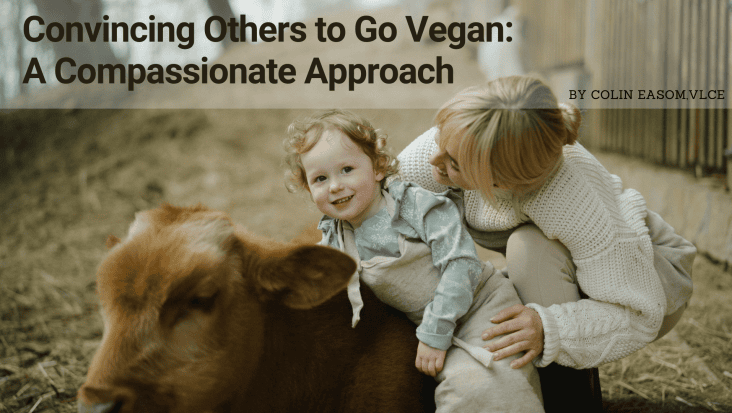posted June 18, 2024

Curious about convincing your friends and family about the incredible benefits of veganism? It’s no secret that veganism has gained significant momentum in recent years due to mounting evidence of its positive impact on personal health, animal welfare, and environmental sustainability. However, merely presenting facts and figures is not enough to convince someone to embrace a vegan lifestyle, rather, share personal stories that resonate with them and appeal to their core values.
To persuade someone to go vegan, focus on their priorities, address their concerns, and appeal to their emotions. Sharing personal stories that illustrate the transformative power of veganism can be one of the most effective ways to accomplish this. Here are some tips on how to do it:
The Power of Personal Stories
Personal stories are a potent tool for promoting veganism because they resonate on an emotional level. By sharing personal stories of how veganism has positively impacted our health, aligned with our values, and contributed to a more sustainable future, we can effectively promote the adoption of a vegan lifestyle.
Tips for Sharing Personal Stories
Miyoko Schinner, renowned vegan chef, creator of Miyoko’s Creamery, and activist, states that when 5000 vegans were interviewed, it was hearing personalized, inspirational stories from other vegans that convinced them to try veganism. Don’t shy away from sharing your story!
When sharing personal stories to advocate for veganism, it’s essential to approach the conversation with empathy, patience, and respect. Recognize that everyone’s journey is unique, and what resonates with one person may not necessarily resonate with another. Here are some practical tips for effectively sharing personal stories:
1. Listen First
Before sharing your own story, take the time to listen to the concerns and perspectives of the person you’re engaging with. Understanding their motivations, values, and barriers can help tailor your message to resonate with their specific interests and needs.
2. Be Authentic
Share your story authentically and transparently, acknowledging both the challenges and rewards of transitioning to a vegan lifestyle. Vulnerability and honesty can foster trust and openness in the conversation.
3. Focus on Shared Values
Identify common ground and shared values that you and the other person may have, such as a commitment to health, compassion for animals, or concern for the environment. Frame your story in a way that highlights these shared values and emphasizes the positive impact of veganism on those values.
4. Provide Resources
Offer resources and support to help the person navigate their journey towards veganism, recommending books, documentaries, websites, and local vegan community groups. Providing practical tools and information can empower them to take the next steps toward making dietary changes.
5. Lead by Example

Ultimately, the most persuasive argument for veganism is living by example. Be a positive role model by demonstrating the benefits of a vegan lifestyle in your own life, whether through your health, compassion for animals, or commitment to sustainability. Your actions speak volumes and inspire others to follow suit.
Talking Points
1. Health Benefits
Veganism offers numerous benefits for overall well-being, including the reversal of heart disease, lowered cholesterol, and sustainable weight loss. Personal stories that highlight these benefits can resonate deeply with those who prioritize their health.
2. Animal Rights Advocacy
Concern for animal welfare is a powerful motivator for adopting a vegan lifestyle. Sharing personal stories that shed light on the ethical implications of animal agriculture can evoke empathy and inspire action. These stories humanize the suffering of animals raised for food and foster a sense of connection and compassion.
3. Environmental Sustainability

The environmental case for veganism is compelling, given the significant ecological footprint of animal agriculture. Personal narratives that illustrate the detrimental effects of animal farming on the planet can effectively convey the urgency of transitioning to a plant-based diet. Highlighting the positive environmental impact of veganism can inspire hope and empowerment.
In conclusion, veganism offers numerous benefits for personal health, animal welfare, and environmental sustainability. By sharing personal stories that resonate with people’s priorities and values, we can effectively promote the adoption of a vegan lifestyle and contribute to a better world for all.

Colin Easom is a certified Vegan Lifestyle Coach and Educator with the Main Street Vegan Academy. He is a Forks Over Knives-certified vegan chef and certified in Plant-Based Nutrition through the T. Colin Campbell Center for Nutrition Studies and Cornell University. Additionally, Colin is a certified personal trainer with specialties in yoga, fitness nutrition, orthopedic exercise, and weight management, a certified Meditation Teacher, a Master level Reiki Practitioner, and a certified astrologer.
Colin has been vegan since 2010. He and his husband, Roy, run Rancho Vegano, a vegan coaching business and a vegan bed and breakfast in Tucson, AZ.

